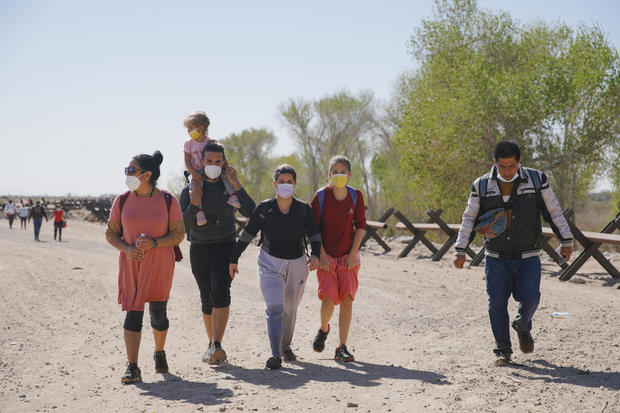Using pandemic-related border restrictions, the Biden administration this month launched a deportation operation to Colombia amid a sharp increase in arrivals of migrants from that country to the U.S.-Mexico border, Department of Homeland Security (DHS) officials told CBS News on Thursday.
Since the start of the campaign, which had not been previously reported, the U.S. has expelled several hundred Colombians under a border rule known as Title 42, which blocks migrants from seeking asylum due to public health concerns, the DHS officials said. The rule was first implemented by the Trump administration.
“Following discussions with the Government of Colombia, in March 2022, DHS began repatriating Colombian nationals to Colombia pursuant to CDC’s Title 42 public health order,” DHS said in a statement to CBS News.
First enacted in March 2020, Title 42 allows U.S. border agents to quickly “expel” migrants instead of processing them under regular immigration laws, which would otherwise require U.S. officials to review the cases of asylum-seekers who claim they could be persecuted or tortured if deported.
It’s unclear how long the recent wave of expulsions to Colombia, which began on March 4, will continue, but it already represents a marked increase from the 20 Colombians expelled under Title 42 in February. Prior to the recent operation, the vast majority of Colombian migrants were allowed to stay and seek asylum in the U.S.
Immigration and Customs Enforcement (ICE) is operating the expulsion flights to Colombia, the agency confirmed. ICE said all migrants are medically screened and tested for COVID-19 before being expelled. They must test negative and not exhibit symptoms of COVID-19 before boarding the expulsion flights to Colombia.
Advocates for asylum-seekers condemned the Title 42 operation to Colombia.
“The Biden administration is so determined to keep expelling migrants without giving them an opportunity to ask for protection in the United States, that they’re paying several hundred dollars per person to put them on planes back to South America,” said Adam Isacson, a policy analyst at the Washington Office on Latin America.
Katie McTiernan/Anadolu Agency via Getty Images
Fourteen months in, the Biden administration has continued the Title 42 expulsions, arguing they remain necessary to reduce the transmission of COVID-19 inside border processing facilities. To date, U.S. officials have carried out 1.7 million expulsions under Title 42, over 70% of them under President Biden.
While Title 42 has been mostly used to expel Mexican and Central American migrants to northern Mexico, the policy has also allowed the U.S. to place some border-crossers on deportation flights to Brazil, Ecuador, Guatemala, Haiti and Honduras.
The expulsion campaign to Colombia, a close U.S. ally, marks one of the largest Title 42 air operations outside Central America since last fall, when the Biden administration expelled 10,000 Haitians to their destitute homeland in roughly three months — a move that sparked outcry among progressives.
Colombia became the fifth-highest source of non-Mexican migration to the U.S. southern border last month, as well as the largest from South America, overtaking countries like El Salvador, Venezuela and Haiti.
In February, 9,600 Colombian migrants entered U.S. custody along the southern border, an all-time high, according to government data. In fiscal year 2022, which started last October, U.S. border officials have already processed 23,985 Colombians — a 287% increase from the previous fiscal year.
Most migrants from Colombia fly to Mexico and then attempt to enter the U.S. illegally near Yuma, Arizona, where 6,997 — or 73% — of the Colombians arrested in February were processed, Customs and Border Protection (CBP) figures show. Another 1,116 Colombians crossed near Del Rio, Texas, last month.
Citizens of Colombia don’t need visas to enter Mexico, though that could change if arrivals of Colombians to the U.S. border remain high. At the behest of the U.S., the Mexican government has already ended visa-free travel for Venezuelans, Brazilians and Ecuadorians.
The Biden administration has maintained a close relationship with Colombia, praising its current center-right government for hosting 2 million Venezuelans who fled their country’s economic collapse and for providing them temporary legal status.
“Our hemisphere migration challenges cannot be solved by one nation,” or at any one border, Mr. Biden said beside his Colombian counterpart, President Iván Duque, during a White House meeting earlier this month. “We have to work together.”
The Colombian foreign ministry did not respond to requests to comment on the U.S. deportations.
In January, DHS announced it would expel some Venezuelan migrants processed at the U.S. border to Colombia if they used to live there. While officials said the expulsions would continue on a “regular basis,” just two Venezuelans were expelled to Colombia that month.
While Mr. Biden’s administration exempted unaccompanied children from Title 42 early in his presidency — and codified that exemption this month after a federal court order — it has resisted calls from Democratic lawmakers, public health experts and advocates to end the expulsions, which are backed by Republicans.
Another recent court ruling, however, could force the administration’s hand on the issue.
A federal court ruling from earlier this month, if upheld, will require U.S. immigration authorities to interview migrant families traveling with children to ensure they will not face harm if expelled, or to end Title 42 altogether for that population.
The Centers for Disease Control and Prevention, which authorizes Title 42, has set a March 30 deadline to decide whether to continue the migrant expulsion policy.

